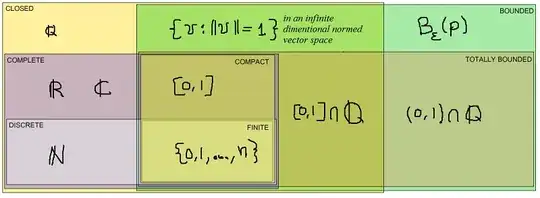I am going through the chapter on compactness and completeness from Sternberg's Advanced Calculus and trying to build an intuition for what many of this topological properties mean, and which imply which. The book defines these concepts in the setting of metric spaces, but most of what I found online is in the about topology, and from what I see (correct me if I am wrong) it doesn't change the general picture much.
I've made this diagram to see whats the relationship of the different concepts and have examples of each. I don't know if it is correct. For example, Is it true that a bounded complete metric (sub)space is compact (and therefore totally bounded)? Then why bother defining total boundedness? If you don't think anything else I wrote is a valid question stick to answering that, although pointing out any misconceptions I might have is appreciated.

For intuition about compactness I've found this posts really helpful. It helps me to think that there are (at least) two different kinds of infinity: one in the sense of largeness (of which boundedness is the opposite), and another in the sense of denseness (of which discreteness is the opposite).